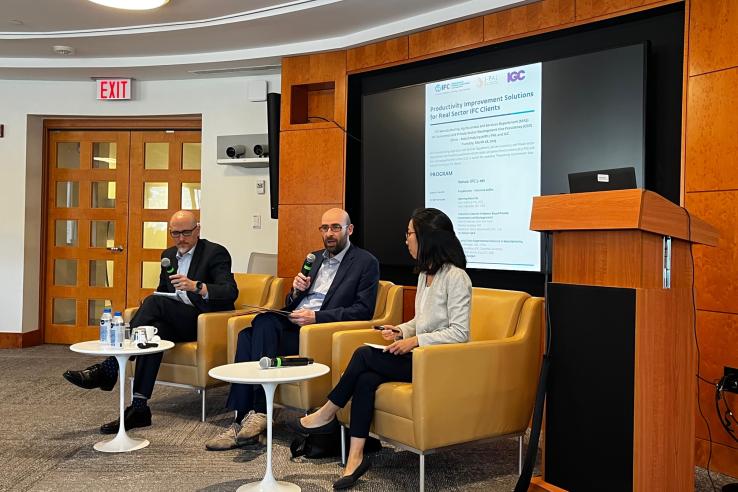Firmas
Identifying policies and programs that increase private sector firms’ productivity and growth may have important consequences for development and poverty alleviation. J-PAL’s Firms sector seeks to evaluate what works best in generating firm growth and raising productivity. The sector also seeks to test the impact of these policies on employee welfare, the environment, and the broader economy.
J-PAL affiliates’ research in this sector focuses on understanding and relieving constraints to generating firm growth. Topics of study include the impacts of management practice improvements, the impacts of policies that facilitate access to markets and global value chains, effective policy levers for firm expansion, and the importance of large firms in generating employment. We hope that new research in the sector will explore the role that firms play in driving economic growth, whether the size of firms generates or reduces inequality, and whether firms’ gains trickle down to their employees.
In addition to supporting policymakers in applying evidence from randomized evaluations to their work, sector chairs and staff write evaluation summaries, policy insights, and policy publications that synthesize general lessons emerging from the research.

Policy insight
Market access: Connecting firms and entrepreneurs to markets to spur business and job growth
Improved access to markets has often helped small firms in low- and middle-income countries grow by boosting firm revenues and profits. These interventions have been effective because they have led to new sales, helped firms connect with new types of buyers, and increased information sharing and...

Blog
Expanding access to financing for SMEs
Access to finance is critical for firms to grow, innovate, and create jobs that help workers escape poverty. However, small- and medium-sized enterprises (SMEs) worldwide are often underserved by financial institutions. In this blog, we explore early findings on SME financing for policymakers...

Evaluation
The Impact of Bid Training on Small Firm Growth in Liberia
Researchers evaluated the impact of a bid training program on the business performance of local small and medium-sized firms. The bid training led firms to bid on and win more contracts, with the positive impacts concentrated on a quarter of firms.

Blog
J-PAL expands efforts to promote corporate sustainability and social impact partnerships
After 20 years of evidence generation and synthesis delivered in partnership with cross-sector stakeholders, in the next decade, J-PAL is accelerating our work to bring evidence-based strategies to drive corporate sustainability and social impact.

Blog
J-PAL partners with the IFC and IGC to discuss global supply chains, sustainability, and research collaboration
Can more firms learn from randomized evaluations to improve business operations in developing economies? How can development institutions better support clients to achieve sustainable growth and key performance improvements in terms of productivity, gender, work-related practices, skills, and other...

Blog
Shaping the right incentives for firms to facilitate climate adaptation and improve environmental quality
IPA and JPAL have supported numerous rigorous research studies exploring diverse questions related to climate change and sustainable development. In particular, since 2020, the King Climate Action Initiative at J-PAL has funded several randomized evaluations addressing these questions as well as...

Blog
Jobs and Opportunity Initiative commits first round of funds for research on entrepreneurship and enterprise development
Covid-19 has had a dramatic and lasting impact on the micro, small, and medium enterprise landscape worldwide, driving many to shut down or radically reshape the way they do business. The consequences of this shift extend beyond the firm to the livelihoods of its workers and their families...

Policy insight
Supporting firm growth through consulting and business training
Economists have long identified large differences in productivity between countries and between firms. One potential explanation for the persistent gap is that some firms have better management practices than others.



